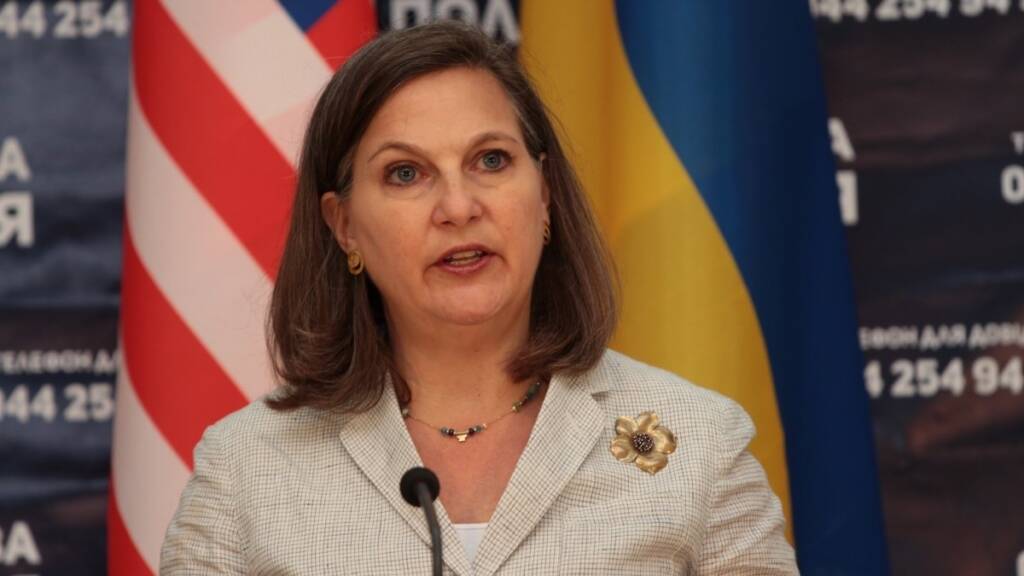US Under Secretary of State Victoria Nuland shot to limelight due to 2014 Euromaidan protests in Ukraine. 10 Years later, it’s a different story.
In a recent interview with CNN, US Under Secretary of State Victoria Nuland displayed an unusual tone of urgency. She advocated for Congressional approval of an additional $61 billion in funding for what she described as a crucial effort to support Ukraine, a project driven by neoconservative agendas.
Join us on Telegram: https://t.me/tfiglobal
Nuland’s appeal included the familiar rhetoric often employed to secure backing for military interventions, emphasizing a commitment to defending democracy and freedom globally. When questioned about her confidence in Congress’s support for the bill, Nuland expressed optimism, citing a historical precedent of the United States’ involvement in international matters aligned with democratic values.
This scenario illustrates a common strategy among NeoCons, who frame their policies within the context of patriotism and American principles. According to this viewpoint, opposition to such initiatives is portrayed as contrary to national interests, suggesting a direct link between support for the proposed funding and allegiance to the ideals of democracy and freedom.
Americans are increasingly skeptical of the narratives pushed by NeoCons regarding foreign interventions. This growing awareness challenges the notion of a collective “we” that these advocates refer to when promoting military actions abroad. Instead, it highlights a divide between policymakers who advocate for such interventions and the general public, who bear the financial and moral burden of these decisions.
This skepticism is fueled by reflections on past interventions, such as the invasion of Iraq under false pretenses, which led to significant loss of life and instability. Similarly, the 20-year engagement in Afghanistan ended with the return of the Taliban, raising questions about the effectiveness and motives of U.S. foreign policy. The situations in Syria, Libya, and the controversial involvement in Ukraine’s 2014 political upheaval further exemplify concerns over the true objectives of these interventions.
Read More: Putin’s TARGET list is causing PANIC in NATO Camp
These instances prompt critical examination of claims that such actions defend democracy and freedom. The American public’s disillusionment suggests a desire for greater accountability and transparency in foreign policy decisions, challenging the narrative that such interventions are in the collective national interest.
The growing skepticism among Americans towards the narratives of NeoCons, especially regarding war, is becoming evident. This shift in perception offers a glimmer of hope for a more informed public discourse. In the same interview, Nuland expressed optimism that, after hearing from their constituents, House Members would approve the proposed $61 billion aid package for Ukraine upon their return to session.
Recent public opinion polls reveal a stark contrast to expectations that Americans would support further funding for the conflict in Ukraine. In fact, a significant majority, with a Harris poll indicating around 70 percent, advocate for diplomatic efforts to bring the Ukraine conflict to a close.
Lawmakers, upon engaging with their constituents, are more likely to encounter a strong opposition to additional financial commitments towards the ongoing situation in Ukraine. The prevailing view among the American public is a clear rejection of the continuation of what many perceive as a brutal, futile, and disastrous involvement in the conflict.
Read More: Putin’s Unstoppable Rise Amid Two Years of War Transformations
Nuland presented a new rationale for continuing financial support to Ukraine, emphasizing that a significant portion of the funds would be channeled back into the U.S. economy, specifically through the manufacture of weapons. At a time when inflation is eroding the purchasing power of the middle class and the poor, the suggestion that funneling money into the arms industry is beneficial is disconnected from the broader economic pressures facing most Americans.
The notion posits that the economic cycle of defense spending justifies the allocation of resources away from domestic needs such as infrastructure and border security. This perspective is particularly contentious when considering the tangible consequences of military conflict, illustrated by the destruction of advanced military equipment like the M1-Abrams tank in combat situations.
Ukraine’s Euromaidan protests made Nuland what she is today and Ukraine-Russia conflict marks the end of her power and agenda. Nuland is officially over!
